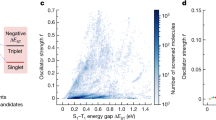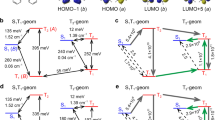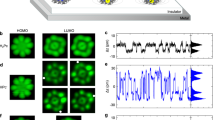Abstract
MODERN physical theories1 treat the fluorescence of all substances as the re-emission of previously absorbed radiation during the return of a chemical molecule to a stable form from an activated form, possessing a mean free life of 10− 8 to 10− 9 second. Since it has been shown that, in any atom, only the outermost, or valency, electrons are concerned in the absorption or emission of light waves of the visible order of frequency, it follows that fluorescent emission is necessarily concerned with the re-formation of stable valency bonds (or possibly stable ‘lone-pairs’ of electrons) from previously activated molecules.
This is a preview of subscription content, access via your institution
Access options
Subscribe to this journal
Receive 51 print issues and online access
$199.00 per year
only $3.90 per issue
Buy this article
- Purchase on Springer Link
- Instant access to full article PDF
Prices may be subject to local taxes which are calculated during checkout
Similar content being viewed by others
References
F. Perrin, Annales de physique, 12, 169–275; 1929.
Pringsheim, Zeit. für Physik, 38, 161; 1926.
Kauffmann, "Beziehungen zwischen physikaliachen Eigenschaften and chemischer Konstitution".
Author information
Authors and Affiliations
Rights and permissions
About this article
Cite this article
WATERS, W. A Connexion between Fluorescence and Free Neutral Radicals. Nature 128, 905–906 (1931). https://doi.org/10.1038/128905c0
Issue Date:
DOI: https://doi.org/10.1038/128905c0
Comments
By submitting a comment you agree to abide by our Terms and Community Guidelines. If you find something abusive or that does not comply with our terms or guidelines please flag it as inappropriate.



